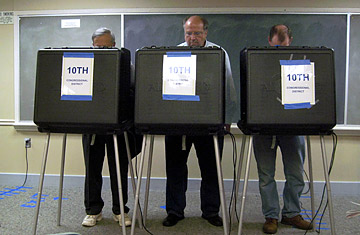
Voters cast their ballots at an "in-person absentee" voting location at McLean Governmental Center in Virginia on Oct. 25
(2 of 2)
Poll workers: Synchronize your watches!
At an Arlington County, Va., training session for poll workers on Halloween, the 60 people who showed up were handed a 109-page manual and asked to take a seat. The crowd included a middle-aged man in a business suit, an elderly woman walking with a cane, a mother and son, and a woman wearing a sexy-maid costume.
Linda Lindberg, registrar for the county, fired up a PowerPoint presentation and warned the group not to become overwhelmed by what they were about to hear. But despite her American-flag T shirt, earrings and bandanna, she seemed a bit overwhelmed herself. "We're so looking forward to seeing the end of the day on Tuesday," she began. "I can't tell you how much."
The trainees spent two hours listening to a truly astounding list of tasks they would be responsible for handling. Nothing less than the full weight of democracy would rest on their shoulders.
Here is a tiny sampling of what poll workers nationwide will do on Tuesday:
Arrive before dawn (in Virginia, at 5 a.m.).
Synchronize watches by calling a specified "time of day" hotline.
Swear to uphold the Constitution.
Unseal voting machines. Boot up electronic voting machines and print out receipts to certify that no votes have yet been cast. Fix printer jams. Set up privacy screens for paper ballots.
Dress professionally. "Be conscious of your personal hygiene," the Arlington trainees were told. "Wear comfortable but clean and decent clothing. Nothing revealing."
Politely ask voters wearing candidate propaganda to remove their gear (per law in Virginia). Offer them an oversize men's shirt to wear over their buttons and T shirts as an alternative.
Cope with threats of violence. "If a bomb threat is phoned in, get as much information from the caller as possible," the manual directs. "If someone is known to have a weapon, have at least two election officers approach the individual together and simply ask him to leave the weapon outside."
Refrain from talking about politics. Cell-phone use is also verboten. And workers are instructed not to leave the polling area until they are dismissed — which is usually around 9 p.m.
For all of this, they will receive $150 each, and a new President.
This year, some voter-advocacy groups are predicting extremely long lines at certain precincts in Virginia, Ohio and Florida — and the lawsuits have already begun. In Virginia, "the allocation of polling-place resources is plainly irrational, nonuniform and likely discriminatory," charges a complaint filed on Oct. 27 against the state by the Virginia State Conference of the NAACP. Virginia governor Tim Kaine disputes this charge and promises an orderly election, noting that the state has a short ballot this year, along with 4,700 more voting machines and 11,000 more poll workers than in 2004.
The truth is, your fate on Tuesday will depend mostly on a combination of luck and geography. Most people around the country will not have to wait for very long, Allen says. But some people will have to wait a very, very long time.
To minimize your suffering, arrive between 10 a.m. and noon or between 2 and 4 p.m. And be nice to the person who gives you an "I Voted" sticker. That person has been up since dawn defending your democracy against the forces of chaos.
